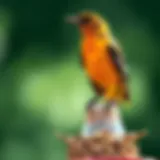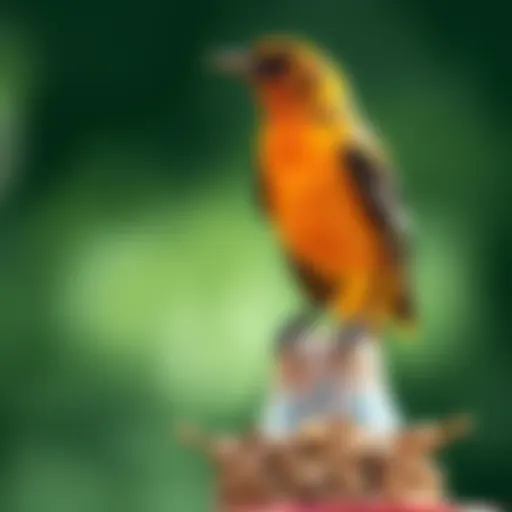Financial Insights on Owning Birds from PetSmart
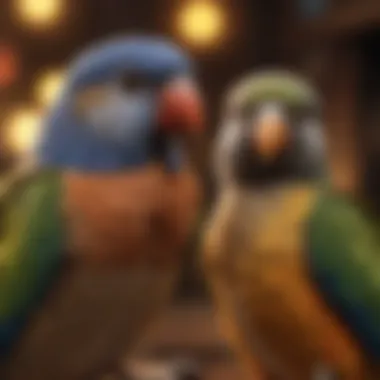

Intro
Owning a pet bird can be a rewarding experience, yet it comes with its fair share of financial considerations. From the moment you decide to welcome a feathered contender into your home, it’s essential to address the various costs associated with their care. This article delves into these financial aspects associated with acquiring and caring for pet birds from PetSmart, providing insights for prospective bird owners.
It’s easy to get swept up in the excitement of bird ownership, but understanding the full spectrum of costs—from the initial purchase to ongoing expenses—can prepare new pet parents for a successful journey. Whether it’s the choice of species, habitat setup, or keeping your bird healthy, grasping these elements will ultimately aid in making informed decisions that align with your financial capabilities.
Now, let’s embark on this informative expedition by taking a closer look at the foundational aspects of avian care and their accompanying costs, setting the stage for a holistic understanding of what it takes to be a responsible bird owner.
Initial Investment in Pet Birds
When venturing into the world of pet birds, understanding the financial landscape becomes crucial. The initial investment forms the foundation of your journey as a bird owner. Not only does it define how much you’ll spend upfront, but it essentially frames your commitment to responsible avian care.
Getting a bird can feel like setting foot into a new realm, with vibrant colors, sweet melodies, and a flutter of wings. However, one must not forget, there’s a price tag attached to all that joy. One significant consideration is the species pricing, which varies significantly among different birds. For example, a fancy macaw can command high prices, often running in thousands, while a budgerigar may only set you back as little as $20-$30. Understanding these price variations helps prospective bird owners gauge their budget more appropriately.
Additionally, it's not just the cost of the bird itself that one needs to account for. The initial setup costs can pile up quickly if you're not careful. From specialized cages to suitable equipment, food and supplies, and enrichment toys for mental stimulation, these expenses can be surprisingly substantial.
As you explore pet birds, it's essential to pencil in these financial commitments into your budgeting plans. Doing so not only protects your wallet but enhances the experience of bird ownership. You wouldn't build a house without a solid foundation, so why would you bring a bird into your life without the proper initial investment?
In summary, the initial investment in pet birds is far more than just the cost of acquisition. It encompasses an array of crucial elements that collectively contribute to the welfare of your feathered friend, ensuring that both you and your pet can thrive in a joyful, enriching environment. Let's take a closer look at the specifics of these initial costs.
Understanding Species Pricing
Diving deeper into the species pricing, it is clear that each type of bird carries its own financial implications. Lovebirds, for example, are relatively affordable, averaging around $40. In contrast, more exotic birds, such as African Greys, can range between $800 to $2,500 depending on their age and temperament. It’s worth noting that every bird has its own personality and care needs, which can influence the price as well. The rarity of certain species often results in higher costs. Don't overlook the long-term considerations tied to different species as well; a parakeet might have a shorter lifespan compared to a cockatoo, which can considerably add to long-term investments.
Costs of Initial Setup
Setting up your home for a bird can feel overwhelming, but it’s essential for both your comfort and the pet's happiness. Here’s a breakdown of the key components:
Cages and Equipment
The cage you choose is arguably one of the most significant purchases in this initial phase. A good cage must balance size, materials, and features. Bigger is often better when it comes to avian housing, allowing your feathered friend space to stretch and move. An ideal cage should offer a variety of access points and be built from safe materials, minimizing the risk of injuries. For example, stainless steel cages are popular due to their durability and ease of cleaning. Investing in a high-quality cage means investing in your bird's well-being.
However, remember that the initial price of a cage can range from $50 for smaller species to over $300 for larger or more elaborate models. The right equipment also includes things like perches, water bottles, and food bowls. Essentials need to be considered seriously since they ensure your bird's habitat is not only comfortable but also safe.
Food and Supplies
When it comes to food and supplies, think of it as the fuel for your pet's engine. Selecting the appropriate diet is crucial, and the offerings at PetSmart cater to varying needs of different species. Filling your shopping cart with bird food doesn’t just mean treating your pet to seeds and pellets; fresh fruits and vegetables also play an important role.
Typically, budget around $20-$30 per month for standard food supplies. This doesn’t include the occasional treat or supplement you may want to include for health; these can quickly add up. As you plan, consider any food allergies or dietary restrictions your pet may have to make sure every penny is well spent.
Toys and Enrichment
Birds are intelligent creatures and require toys and enrichment to stave off boredom. Unfortunately, failing to provide adequate stimulation can lead to behavioral issues. You will find a myriad of options at PetSmart, from simple wood blocks to more advanced puzzles and foraging toys. The cost of toys can range widely, from $5 for basic items to upwards of $50 for intricate systems designed for cognitive engagement.
Investing in quality toys not only enriches your bird's life but also reduces the chances of pick up unwanted habits like feather plucking. Keeping your bird entertained can generate long-lasting health benefits, cementing your pet-owner relationship and enhancing life quality for both you and your feathered companion.
Recurring Expenses for Bird Care
When considering bringing a feathered friend into your home, it's crucial to take a good look at the ongoing costs of bird care. Costs don't just stop after the initial investment, but rather, they continue to pile up over time. Understanding these expenses is pivotal for responsible bird ownership. You want to avoid the situation where you're caught off guard when the monthly bills come knocking on your door.
Regular expenses include food, health care, habitat maintenance, and potentially insurance. As you navigate the world of bird ownership, having a grasp on these recurring expenditures will help maintain both your bird's well-being and your financial stability. Without a proper budget, the joy of having a pet bird can quickly turn into a financial burden.
Monthly Feeding Costs
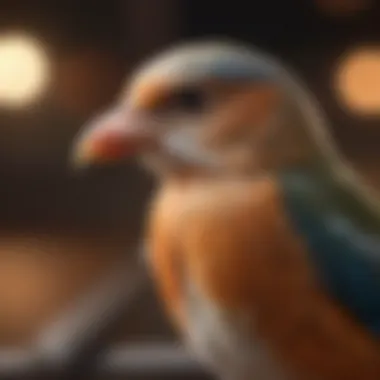

Feeding your bird is, no doubt, one of the most significant recurring costs. Birds have specific dietary needs that you'll need to cover. Depending on the species, this can vary from seeds and pellets to fresh fruits and vegetables. While parakeets or finches might nibble on affordable seed mixes, larger birds like macaws or cockatoos require a more balanced diet, often tilting toward pricier options.
Establishing a budget for food isn’t just about tossing seeds in the cage; consider the nutritional needs of your birds. Factors to consider:
- Type of Bird: Larger birds typically consume more food than smaller ones.
- Quality of Food: Organic and specialized diets can raise costs but are important for the health of your bird.
- Additional Snacks: Birds love treats, like millet sprays or nuts, which can add up and should be accounted for.
Health Care and Veterinary Expenses
Healthcare is a crucial part of pet ownership. Just like a dog or cat, birds require routine check-ups, emergency care, and preventive treatments. Ignoring their health not only affects the quality of life for your pet but can also lead to inflated expenses down the road.
Routine Check-ups
Routine check-ups play an essential role in a bird's health management. They include essential health assessments to catch potential issues early. Annual visits to an avian vet give peace of mind, ensuring your bird is thriving. The key characteristic of routine check-ups is their preventive nature. By catching illness early, you can save on overwhelming procedures later.
- Why Routine Check-ups Matter: Early detection of illness often leads to easier and less expensive treatment.
- Cost Consideration: While it may seem like a chore, budgeting for at least one visit each year is essential.
Emergency Care
Emergencies can arise without a warning, leading to the need for immediate veterinary attention. Be it a potential poisoning incident or an injury from flying into something, having a financial cushion for these unexpected events is crucial. The unique feature of emergency care is that it's unpredictable. Thus, you should set aside a portion of your funds specifically for these unfortunate situations. Paying for emergency care can be startling, but knowing you're prepared can alleviate some stress.
- Taakin care of the unexpected: Every bird owner should have a plan for emergencies.
- Preparation is Key: Keeping some funds aside for emergencies is more than wise—it's vital.
Preventive Treatments
Preventive treatments can include vaccinations, routine blood tests, and medications designed to ward off illness. These may feel like an extra expense, but much like humans, your bird will benefit immensely from preventive healthcare. Preventive treatments often lower overall veterinary costs in the long run by preventing more severe health problems.
- Key to Long-term Health: Think of it as an investment in your bird's future.
- Say Yes to Healthy Birds: Regularly scheduled preventives can help maintain a happier and healthier pet.
Maintenance of Habitat
Keeping your bird's habitat clean and functional is necessary for their overall health and happiness. This includes the recurring need for cleaning supplies, which ensure not only cleanliness but also the comfort of your bird. A clean space can help prevent both illness in your bird and unwanted odors in your home. Here are two main aspects:
Cleaning Supplies
Cleaning supplies are an often-overlooked aspect of bird care expenses. Regular cleaning minimizes bacteria buildup and keeps your bird’s environment healthy. You can't skimp on this part. Regularly washing the cage, cleaning the toys, and maintaining the perches are essential tasks.
- Investment in Health: A clean cage is less likely to contribute to respiratory issues so think of this more broadly as saving on medical costs in the long run.
Repurchasing Consumables
Every pet owner knows that consumables need to be replaced over time. For birds, that means replenishing things like food, bedding, and other supplies. A periodic expense is the cost of repurchasing these items. Understanding how often you need to replace these can help you plan your budget effectively.
- Frequency of Replacement: Varies based on your bird’s habits. For example, if your bird is a chewer, toy replacements will be more frequent.
Insurance Considerations
Lastly, it’s worth weighing the option of pet insurance or health plans for your feathered friend. Just like regular check-ups, insurance can seem like an unnecessary expense until it’s needed. Depending on your bird's potential health challenges, insurance can safeguard against crippling veterinary bills when unexpected issues arise. While insurance doesn’t pay for routine check-ups, it does provide peace of mind and financial protection against higher medical costs.
- Risks and Benefits: Consider bird types, as certain breeds tend to have specific health concerns that may influence your choice.
Being aware of these recurring expenses will not only help you manage your finances but also ensure your bird gets the care it requires to thrive in your home. Planning for these costs up front will always pay off in happiness for both of you.
Long-term Financial Obligations
Understanding the long-term financial obligations involved in owning a pet bird is crucial for anyone considering adding one of these feathery companions to their lives. It's easy for potential bird owners to get lost in the initial excitement of bringing home a colorful parakeet or a striking cockatoo, yet the reality is that these beautiful creatures can live for many years, some even decades. This longevity necessitates a commitment that extends beyond mere one-time expenditures. Thus, it’s vital to grasp what being a bird parent really entails.


Lifespan and Commitment
Most birds, depending on their species, boast impressive lifespans. For example:
- Budgerigars can live from 5 to 10 years.
- Cockatiels may stick around for 10 to 15 years.
- African Grey Parrots can reach ages of 40 years or more.
The extended lifespan directly correlates with the level of commitment expected from owners. You might find it hard to believe, but taking care of a bird for many years requires not only emotional investment but also financial planning. Unlike a hamster or guinea pig, which may require less monitoring, birds demand consistent social interaction and care. For many avian enthusiasts, this translates into establishing a long-term care plan well before acquiring a bird.
"The bond between a bird and its owner can be profound, but it comes with an undeniable responsibility."
Loyal companionship from a bird can be incomparable, and many owners will tell you that the smiles brought on by these charming critters far outweigh their challenges. However, it should not be overlooked that such investment comes with an anticipation of change—much like planning for a child’s future where you have to consider their education and upbringing.
Potential Cost Over a Bird's Lifetime
When calculating the total costs associated with pet birds, it's easy to overlook how expenses can accumulate over time.
- Regular Expenses
Birds require ongoing purchases that include: - Equipment Maintenance
- Specialty Items
- Insurance
- Food: Their diet, which varies in type and price based on species, can be a considerable expense. High-quality pellets or seeds, alongside fresh produce, might run you multiple hundreds annually.
- Health Care: Regular vet visits (think yearly check-ups) can add up. These can range from routine exams to unexpected emergencies.
- Cages and perches might need replacements periodically. Besides that, enrichment toys, which keep your bird stimulated, will also need replacing.
- Some birds, like macaws, may need specific toys made of specialty materials or even specific health supplements to maintain their well-being. These items can be pricey but are essential for their happiness and health.
- Although not as common as pet insurance for cats or dogs, some owners look into health insurance plans for their birds. Knowing you have that support can relieve a bit of the pressure when faced with unexpected medical costs.
Evaluating Value versus Cost
In the world of pet ownership, one must carefully balance the scales of value and cost. When it comes to pet birds, particularly those from PetSmart, understanding this balance is crucial. The relationship between what you spend and what you gain extends beyond the mere dollars and cents; it intertwines emotional fulfillment, companionship, and long-term financial commitments. In this section, we’ll explore how evaluating this balance can lead to more informed decisions that resonate with your lifestyle and financial situation.
The Worth of Companionship
There's something undeniably special about the bond between humans and birds. Birds are more than just pets; they are companions that bring life to our homes. Unlike many other pets, birds offer unique interactions. Their vocalizations, playful behaviors, and, in some cases, their ability to mimic human speech add a distinct flair to everyday life.
Yet, it’s essential to recognize that companionship comes at a cost. When you invest in a pet bird, you're not merely paying for food or cages; you're investing in a living being that will become part of your family. This emotional dimension adds to the overall equation of value versus cost.
Some factors to consider regarding the worth of companionship include:
- Daily Interactions: Engaging with a bird can lighten your mood, offering stress relief and joy. The investment here isn't just monetary; it’s your time and emotional energy.
- Learning Experiences: Birds can introduce valuable lessons about responsibility and care, especially for younger family members.
- Mental Stimulation: Birds often require mental engagement, which can foster creativity and problem-solving skills in owners as well.
In essence, the worth derived from having a bird as a companion can surpass mere financial assessments. Instead, you might find that the joy they bring far outweighs the costs incurred.
Financial Return on Emotional Investment
When one thinks about financial returns, it often revolves around hard cash or assets. However, with pet birds, the returns can be calculated in emotional dividends rather than just numbers on a spreadsheet. While you might lay out a certain amount for initial costs and regular care, what returns can you realistically expect?
Here’s how to assess the emotional investment versus the financial outlay:
- Happiness Quotient: Many bird owners report high levels of satisfaction. Simply watching a bird’s antics can provide hours of entertainment, making the expense worthwhile.
- Health Benefits: The companionship of a bird may contribute to better mental health. The act of caring for a pet fulfills a nurturing instinct, which often translates into improved emotional well-being.
- Community Connection: Joining bird-lover groups, whether on platforms like Reddit or local clubs, can create a sense of belonging and shared enthusiasm. This social aspect can amplify the overall enjoyment of bird ownership, giving it added value that money can’t measure.
In evaluating the financial return on emotional investment, you may discover that the intangible rewards overshadow the expenses, making the journey in bird ownership not only financially viable but emotionally enriching as well.
"In the end, it’s the moments spent with our feathery friends that create priceless memories."
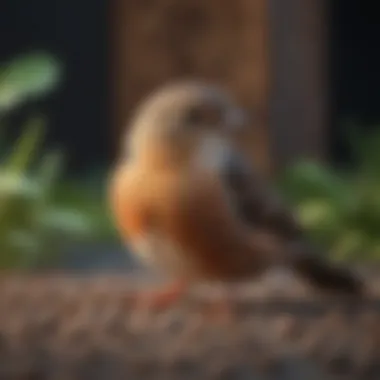

Navigating the financial aspects of bird ownership from PetSmart involves much more than tallying up costs. It means placing a value on companionship and considering how emotional investments play a critical role in defining the overall worth of the experience. By recognizing these nuances, potential bird owners can make choices that enrich their lives and align with their financial frameworks.
Buying Birds from PetSmart
Buying a bird from PetSmart can be an important stepping stone for anyone looking to welcome a feathered friend into their home. The retail giant is well-known for providing a variety of birds, from parakeets to cockatiels, which can appeal to both new and seasoned pet owners. When considering a winged companion, understanding the purchase process and what it entails can help in making a well-informed choice.
PetSmart often sources its birds from reputable breeders, aiming to ensure the health and quality of the birds they sell. Aside from the joy of owning a bird, potential owners should also consider factors such as the price, the health guarantees, and the return policies that PetSmart offers to help cushion the initial investment and its associated risks.
Comparative Pricing Analysis
Before swooping in to buy a bird, a well-rounded comparative pricing analysis is crucial. At PetSmart, the costs can vary significantly based on the species, age, and even color mutations. Here's a general rundown of what one might expect:
- Budgies (Parakeets): Generally, these birds are among the more affordable options, with prices typically ranging from $20 to $50.
- Cockatiels: These delightful birds can cost between $70 and $150, depending on the color and age.
- Lovebirds: Available in a variety of colors, they can range from $50 to upwards of $150.
- Conures: Known for their playful nature, conures can be a bit pricier, reflecting their popularity, with prices generally ranging from $150 to $400.
It’s worth researching similar offerings at other pet stores or avian specialty shops. Online marketplaces can often yield surprising differences in pricing, but remember that prices can sometimes reflect the quality of care the birds received before entering your life.
Understanding Guarantees and Policies
One of the advantages of purchasing a bird from PetSmart is the establishment’s customer-friendly policies, which can offer peace of mind. PetSmart typically provides a health guarantee on their birds, assuring owners that they are getting a healthy pet. Here are key elements of their policies worth noting:
- Health Guarantee: Most birds come with a health guarantee that covers certain diseases and conditions within a specified period after the purchase. Always read the fine print to understand what is covered.
- Return Policy: Should circumstances change, PetSmart has a return policy that allows customers to bring the bird back within a few days for a refund or exchange, although this may not apply in every situation. Be sure to inquire at the time of purchase.
- Care Guidance: Employees can provide essential care tips upon purchase, ensuring that new owners have a solid foundation for keeping their feathered friend healthy and happy.
Purchasing a bird is more than just a financial commitment; it’s a promise to care for a living creature. By weighing the costs against the benefits and considering the protections that PetSmart offers, potential bird owners can make a decision that meets both their hearts and budgets.
Miscellaneous Costs
When we discuss the financial aspects of owning a bird, certain costs may easily slip through the cracks. These miscellaneous costs can be a significant part of the overall budget and should not be overlooked. Failing to account for these expenses can lead to surprises down the road, which is the last thing any responsible pet owner wants. Knowing the ins and outs of these costs helps prospective bird owners prepare and ensures that they are fully equipped to provide a thriving environment for their feathered friends.
Travel and Transportation
Transportation often becomes an afterthought when welcoming a new pet into your life.However, there are instances where travel will be necessary, especially with pets like birds. Whether it's a trip to a vet or a family getaway, understanding this aspect is crucial.
Traveling with birds may mean that you have to invest in proper carriers. These carriers must be sturdy and secure to ensure the comfort and safety of the bird during transit. A decent quality carrier can set you back anywhere from $30 to $100.
Birds can be sensitive to changes in their environment. If you're planning a vacation, it may not always be feasible to bring your pet along. Instead, you might need to consider boarding services, which can often cost $20 to $50 per day. This adds up quickly if you’re away for an extended period, so budgeting for such expenses in advance is wise.
"Budgeting for travel is as essential as budgeting for food - without it, you can easily find yourself in a pinch."
Training and Socialization Expenses
The road to a well-adjusted pet bird involves training and socialization. While some birds come with certain behaviors, fostering a healthy relationship with your pet often means investing time and resources into their training. Bird trainers or classes can range in price quite a bit, sometimes costing around $50 per session. Even online courses are available to novice bird owners striving to decode their pet's specific language.
Socialization is another factor that might incur costs. Workshops or community events involving bird owners can foster a sense of social belonging for both you and your bird. Fees for such gatherings might be negligible or in small amounts but could become regular commitments.
When it comes to training, you may also need to purchase books or resources with insights into methods and techniques—often ranging from $10 to $50 per title. These expenses may seem minor, but together they can add up and form a considerable part of your pet's overall budget.
In summary, when considering the financial aspects of having a pet bird from PetSmart, it's fundamental not only to look at the direct costs but also to prepare for any miscellaneous expenses that can arise. By budgeting for travel, transportation, training, and socialization, you can create a stable financial environment for your new companion and ensure they have a happy and fulfilling life.
The End
When it comes to bringing a pet bird into your home, the financial implications are substantial. This article has journeyed through the different layers of costs involved, shedding light on the intricacies that both current and potential bird owners must consider. By understanding these financial aspects thoroughly, a bird owner can make an informed decision, which is crucial not only for the pet’s well-being but also for the health of their personal finances.
Informed Decision-Making
Making the decision to welcome a bird into your life shouldn't be taken lightly. It involves much more than the initial purchase; it’s a commitment that stretches over many years. Here are some essential elements to ponder:
- Species Selection: Each species carries its own price tag, care requirements, and lifespan. Knowing these factors prevents buyer’s remorse down the line.
- Initial Setup Costs: The outlay for cages, food, and toys can add up quickly. Think of it as establishing a welcoming environment for your feathered friend; a good home will benefit both you and your bird.
- Monthly Expenses: Bird care is ongoing. Food quality, veterinary visits, and habitat maintenance will drain your wallet each month, so being prepared will save you a heap of stress later.
- Long-term Financial Obligations: Many birds can live for several decades. It’s crucial to evaluate whether you can sustain these costs long-term. After all, no one wants to feel trapped in a situation where they cannot provide for their pet’s needs.
- Emotional Investment: Lastly, consider the emotional rewards. While costs pile up, the companionship and joy that birds bring can be priceless. Acknowledging this balance will help you stay level-headed when it comes to making decisions.
"A pet bird is as much a part of your family as any other member, and the financial commitment reflects that."
Balancing costs against the numerous benefits requires thoughtful contemplation. It’s important not to gloss over these factors, as they play a significant role in ensuring the welfare of your future pet. By weighing your options carefully and considering both immediate expenses and long-term financial responsibilities, informed decision-making becomes more manageable. In the world of bird ownership, a financially savvy approach will enhance your experience and ultimately lead to a happier, healthier life for both you and your feathered companion.














